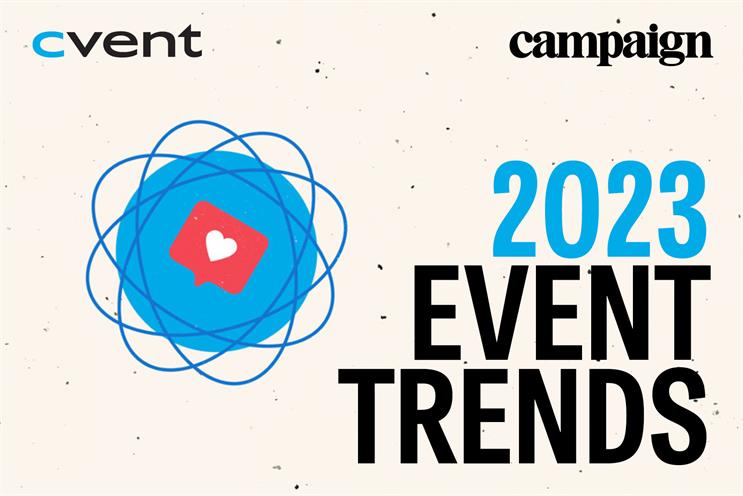
Events are back with a bang. They haven’t just recovered post-pandemic — they’ve emerged as a critical marketing channel to generate demand and build strong brands.
According to Forrester research, 74% of marketers cite events as their most important demand generation tactic. Why? Because events serve an important strategic marketing function: they allow brands to reach new audiences faster, build more personalised relationships with prospects and customers, and drive continuous engagement.
We look at the top five event trends for marketers to look out for in 2023 – and how they can boost your marketing strategy.
1. Events are experiencing a digital transformation
While in-person events are thriving post-pandemic, the sudden pivot to hosting events online during the pandemic greatly accelerated the digitisation of events. In 2023, in-person events will include many more digital touchpoints, allowing marketers to better engage with attendees and measure the direct impact of events.
Research from Forrester shows that 58% of marketers expect their flagship B2B events to remain hybrid, and this looks set to continue in 2023. For marketers, this offers exciting opportunities to reach audiences online, with 76% saying they have increased reach and attendance through the digital transformation of events.
Of course, as with any event, the digital content has to be right. Reaching more people is all well and good, but only if they are getting value from the experience.
So, think about how to integrate more digital interactions into your in-person events throughout the journey — pre-event, at the event and post-event. For example, use web/mobile app experiences pre-event to deliver personalised agendas. At the event, use polls and surveys to get event and session feedback, and post-event, offer on-demand content to attendees.
2. Continuous event engagement will be key
Today, the B2B buyer journey is longer, more complex and involves more stakeholders. Developing deeper engagement across this journey will be crucial for marketing teams to drive revenue. Deeper engagement not only boosts brand experience but also increases customer loyalty and improves the overall customer experience.
Events offer the perfect channel to deepen these relationships with prospects and customers. When weaved into the various stages of the buying process, they can shorten the buyer journey and enable you to build a community around your brand.
One way to drive engagement is to repurpose and reuse the content from your events in other marketing channels. Through channels such as webinars, virtual events and on-demand video content, marketers can build a constantly engaged audience and extend the duration of an event long after the event itself has ended.
3. Event data will enable more personalisation
Deeper engagement means deeper insights. Events offer a greater number of touchpoints than channels such as paid search or email marketing. Digitisation has also made it easier to collect data throughout the event journey, making them more quantifiable and measurable than ever. Marketers can use this data to enhance personalisation and improve targeting.
The goal for marketers should be to use granular event data to build an audience-centric marketing strategy. For example, use engagement metrics to build engagement scores, identify the sessions or content that attendees were most interested in, and the interactions they had at the event. The result? A complete view of the attendee journey and of your attendees’ interests.
4. Event tech spend will increase
Forrester research shows that 57% of marketers have increased their spend on event tech in 2022. This covers both virtual event technology as well as tech to support digital interactions at in-person events.
This increase in spend, coupled with the valuable data that events generate, means one thing: event tech is martech. They are no longer separate pieces of technology.
In 2023, event tech should be a key part of your tech stack, and integrated with your CRM, marketing automation and other systems to ensure a seamless flow of data. This will give you a complete view of the customer journey across all of your marketing tactics.
5. Video will be a key medium for events
According to The Cisco Video Networking Index, video content will account for 82% of all internet traffic by the end of this year.
This, along with the rise of TikTok and the power of streaming platforms such as Netflix, show that snackable and binge-worthy videos are increasingly becoming the King and Queen of content.
And that’s not all: audiences want and expect to watch video content on-demand, when it suits them.
This appetite for on-demand video represents an opportunity to merge event content with other digital marketing strategies, and for marketing teams to align with event teams to plan and distribute event video content pre-event, at the event and post-event. For example, consider creating an on-demand content hub where attendees can access speaker sessions and other exclusive content from your event.
Maximise the full potential of events
As these trends show, events are becoming increasingly digital. For marketers, this can only be a good thing: it means greater opportunities to engage with your audiences, allowing you to collect valuable data and insights and form a holistic picture of your audiences.
As you plan your 2023 marketing strategy, remember that events are not siloed activities. They are a key contributor to your integrated marketing campaigns and can be used at every stage of the buyer journey to deliver personalised content, build relationships with your audience and, ultimately, prove ROI.
Want to nail your event marketing strategy? Explore here.


